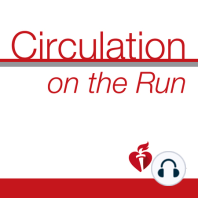18 min listen
Circulation December 6, 2022 Issue
ratings:
Length:
22 minutes
Released:
Dec 5, 2022
Format:
Podcast episode
Description
This week, please join author Sean Pokorney and Associate Editor Shinya Goto as they discuss the article "Apixaban for Patients With Atrial Fibrillation on Hemodialysis: A Multicenter Randomized Controlled Trial." Dr Carolyn Lam: Welcome to Circulation on the Run, your weekly podcast summary and Backstage Pass of the journal and its editors. We're your cohost. I'm Dr. Carolyn Lam, Associate Editor from the National Heart Center and Duke National University of Singapore. Dr Greg Hundley: And I'm Dr. Greg Hundley, Associate Editor, Director of the Pauley Heart Center at VCU Health in Richmond, Virginia. Carolyn, this week's feature, very interesting topic. In patients that have end stage renal disease that require dialysis, questions emerged should we anticoagulate them to prevent stroke, but of course, there's a risk of excess bleeding. Well, this feature discussion today is a study comparing apixaban and warfarin for anticoagulation in exactly this patient population. But before we get to those results, how about we grab a cup of coffee and go through some of the other articles in the issue? Would you like to go first? Dr Carolyn Lam: Absolutely, Greg. So my first paper is a pre-specified analysis of the Paradise MI trial and knowing you'll likely ask me what that was about, Greg, at least to summarize for everyone, the Paradise MI trial compared sacubitril/valsartan with ramipril and its effect on reducing heart failure events after an MI in more than 5,600 patients with an acute myocardial infarction complicated by LV systolic dysfunction, pulmonary congestion, or both. Now in today's paper, what Dr. Mehran and colleagues found was that among patients with a recent AMI and LV systolic dysfunction, heart failure are both, sacubitril/valsartan decreased the risk of coronary related events by 14% as compared with ramipril over a median follow-up of 22 months. The reduction in coronary events occurred with a favorable safety profile. Dr Greg Hundley: Wow, Carolyn, very interesting. Another indication perhaps for sacubitril/valsartan, especially relative to ACE inhibitors. So what does this mean for us clinically? Dr Carolyn Lam: Well, the results really cause us to consider if in addition to antiplatelets and lipid lowering therapies, sacubitril/valsartan may be explored as a potential agent to mitigate the residual risk in survivors of AMI. Of course, dedicated studies are necessary to confirm this finding and elucidate its mechanism. Dr Greg Hundley: Oh, very nice, Carolyn. Well, my first paper comes to us from the World of Preclinical Science and Carolyn, this study evaluated the scavenger receptors stabilin-1 and stabilin-2, proteins that are preferentially expressed by liver sinusoidal endothelial cells. Now, they mediate the clearance of circulating plasma molecules controlling distant organ homeostasis. And studies suggest that stabilin-1 and stabilin-2 may impact atherosclerosis. So in this study, the investigative team led by Professor Cyrill Géraud from the University Medical Center and Medical Faculty in Mannheim, Heidelberg comprehensively studied how targeting stabilin-1 and stabilin-2 affects atherosclerosis. Dr Carolyn Lam: Huh. All right, nicely explained. And so what did they find, Greg? Dr Greg Hundley: Right, Carolyn. So inhibition of evolutionary conserved class H scavenger receptors, stabilin-1 and stabilin-2, reduced aortic plaque burden in preclinical models and athero protection was mediated likely through down regulation on transcriptional factor ERG1 in monocytes by multifaceted plasma protein changes. And then finally, Carolyn transforming growth factor beta induced periostin, reelin, and they are novel ligands of stabilin-1 and stabilin-2 and are implicated in the development of atherosclerosis. Dr Carolyn Lam: Okay. Wow. Could you give us a take home message, please Greg? Dr Greg Hundley:
Released:
Dec 5, 2022
Format:
Podcast episode
Titles in the series (100)
Circulation November 28, 2017 Issue: Circulation Weekly: Your Weekly Summary & Backstage Pass To The Journal by Circulation on the Run
